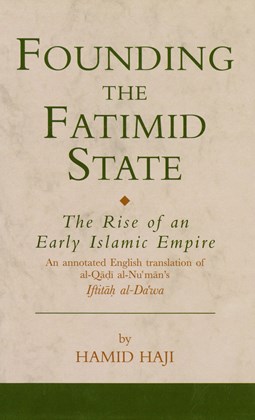Founding the Fatimid State: The Rise of an Early Islamic Empire An Annotated English Translation of al-Qāḍī al-Nuʿmān's Iftitāḥ al-Daʿwa
I.B. Tauris in association with the Institute of Ismaili Studies
Covering a major work of one of the most important thinkers of early Islam, this is a fresh translation of a text of inestimable importance to our understanding of Fatimid rule that will appeal to all serious students of early Islamic history and culture. This book, the Iftitāḥ al-Daʿwa, is the most important primary source for the emergence of the Fatimid state in the early years of the tenth century. Its author, al-Qāḍī al-Nuʿmān, was an official historian of the Fatimids and an eminent exponent of Ismaili jurisprudence – as well as being perhaps the most distinguished and creative of all the Fatimid thinkers. The Iftitāḥ is al-Nuʿmān’s major historical work, and records in detail the background to the establishment of the Fatimid state, first in Yemen and then in north Africa. It is based on official archival and biographical documents that were accessible to the author at the time, and which have not survived. It is thus a highly significant resource for understanding the social and political conditions which prevailed when the Fatimids began to consolidate their rule.
Maps and Tables
Acknowledgements
Chronology
Introduction
Translation of Iftitāḥ al-daʿwa: Commencement of the Mission
1. The account of the beginning of the mission (daʿwa) in the Yemen, the [dāʿī] in charge of it, and the factors which allowed him to accomplish his mission.
2. Anecdotes about Abu al-Qasim, head of the daʿwa in the Yemen.
3. Forerunners sent to the Maghrib before the dāʿī’s arrival there.
4. The arrival of Abu ’Abd Allah, dāʿī of the Maghrib, to the head of the daʿwa in the Yemen and his departure from there on his behalf.
5. Abu ’Abd Allah’s meeting with Kutama tribesmen in Makka and his arrival with them in Kutama territory.
6. Abu ’Abd Allah’s arrival in Kutama territory and the beginning of his mission there.
7. Ibrahim b. Ahmad’s reply to Musa b. ‘Abbas conveyed by an envoy from him and his message to Abu ’Abd Allah.
8. The uprising of the coalition of Kutama against Abu ’Abd Allah to seize him in Ikjan.
9. Abu ‘Abd Allah’s departure from Ikjan and his journey to Tazrut.
10. Meeting of the coalition to find a way to resolve the case of Abu ’Abd Allah.
11. Offensive by all the tribes against Abu Abd Allah and his victory over them.
12. Abu ‘Abd Allah’s founding at Tazrut a place of refuge and a base from which to wage war against the tribes.
13. Measures adopted by Abu ’Abd Allah among the Kutama to reign over them and for which they submitted to him.
14. The conquest of the town of Mila.
15. Abu Hawal’s military expedition to Kutama territory and his retreat from there.
16. Abu Hawal’s second military expedition and his defeat.
17. Al-Mahdi’s emigration from his residence in the east, and his arrival in Sijilmasa.
18. The conquest of the town of Satif.
19. Ziyadat Allah’s dispatching Ibrahim b. Habashi to Kutama territory to fight Abu ’Abd Allah and his defeat.
20. The conquest of the town of Tubna.
21. The conquest of the town of Billizma.
22. The battle of Dar Maluwwal.
23. The conquest of the town of Tijis.
24. Ziyadat Allah’s proclamation addressed to the provinces to pacify them and calm down the fright which he learnt had spread therein.
25. Ziyadat Allah’s setting out at the head of troops for al-Urbus and his withdrawal from there.
26. The conquest of the town of Baghaya.
27. Abu ’Abd Allah’s battles at Majjana and in its region adjacent to al-Urbus.
28. The battle of Dar Madyan.
29. The conquest of Qastiliya and Qafsa.
30. The conquest of the town of al-Urbus and Ibn Abi al-Aghlab’s defeat.
31. Ziyadat Allah’s flight from Raqqada.
32. Ibrahim b. Abi al-Aghlab’s arrival in al-Qayrawan and his designs over the city.
33. Abu ’Abd Allah’s arrival in Ifriqiya, his stay in Raqqada and the consolidation of his position there.
34. Safety granted by Abu ’Abd Allah to the populace and his administrative and political measures.
35. Ziyadat Allah’s journey, his arrival in the east, and events relating to him until his death.
36. Abu ‘Abd Allah’s march to Sijilmasa, his conquest of that town and al-Mahdi’s departure from there.
37. Al-Mahdi’s coming from Sijilmasa and his arrival in Ifriqiya.
38. Political measures taken by al-Mahdi as imam and applied publicly amongst the people.
39. Events relating to the hypocrites against al-Mahdi and the outcome of their affair.
40. Inhabitants of Ifriqiya who betrayed the clemency granted to them and their punishment for treason and hostility.
41. General events relating to al-Mahdi until his death.
42. Summary account of the period from the death of al-Mahdi, peace be upon him, until the time this book was composed.
Bibliography
Index
‘A very useful addition to the translated historiographic corpus.’
– Muslim World Book Review
Hamid Haji is a specialist in Arabic Ismaili literature. He studied at the Sorbonne and is currently Research Associate at the Institute of Ismaili Studies. His publications include A Distinguished Da‘i Under the Shade of the Fatimids: Hamid al-Din al-Kirmani and His Epistles (1998).

